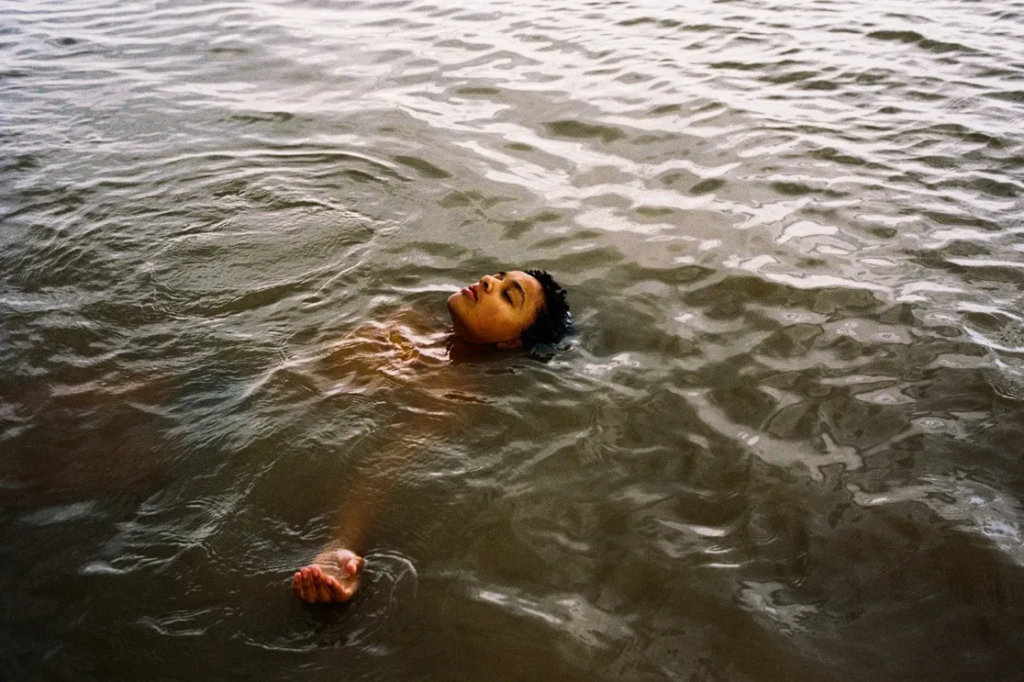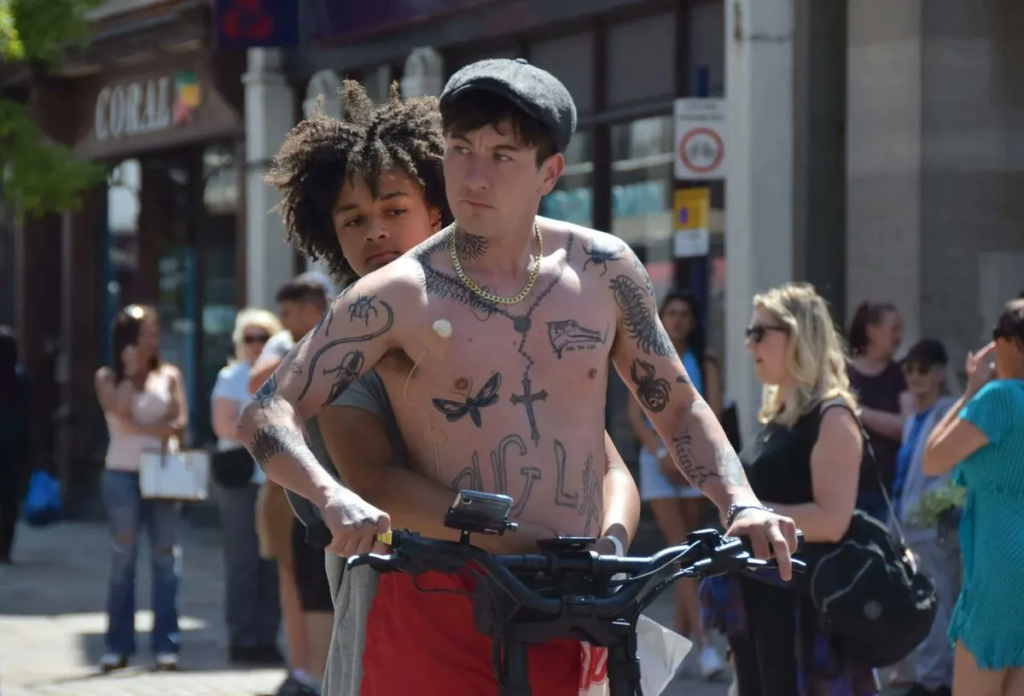Director: Andrea Arnold
Writer: Andrea Arnold
Stars: Barry Keoghan, Franz Rogowski, James Nelson-Joyce
Synopsis: Bailey lives with her brother Hunter and her father Bug, who raises them alone in a squat in northern Kent. Bug doesn’t have much time to devote to them. Bailey looks for attention and adventure elsewhere.
Andrea Arnold’s characters, often trapped in isolation, grappling with loneliness, and facing desperate circumstances, are not mere wanderers across their rural or coastal settings. They are souls yearning for love and acceptance, seeking open arms that will never let them go. Arnold’s direction skillfully brings out their emotional depth, evoking a profound empathy in us. Whether it’s Star in American Honey or Cathy in her mossy adaptation of Wuthering Heights, she compels us to want to protect them as they navigate their respective hardships. After premiering her documentary Cow in the 2021 Cannes Film Festival (in the Cannes Premiere section), Arnold is now back in competition with her latest work, Bird. Arnold combines these elements with a touch of anthropomorphic, magical realism, a signature feature in some of her previous works (recall the white horse in Fish Tank).
This time, these elements are more refined and prominent than ever before, adding a unique layer to the narrative. Bailey (the fascinating Nykiya Adams) is at the story’s heart, a twelve-year-old from northern Kent. She shares her home with her half-brother, Hunter (Jason Buda), and father, Bug (Barry Keoghan) who seamlessly fits with Arnold’s storytelling style). He is adorned with insect tattoos, including a scorpion, spider, beetle, and butterfly, among others. Like the exoskeletons of the animals tattooed across his body, Bug uses these marks as a shield, concealing his emotions from his penury. Meanwhile, Hunter, alongside his friends, is taking justice into their own hands. They do weekly raids where they do damage to some local abusers, filming it and putting the videos online.

This family tries to hold itself together through harsh means – wishing they get out of the gutter. They live in a city that, in the captivating lens of cinematographer Robbie Ryan, reeks of hopelessness, adding to the British filmmaker’s pet topic of social miserabilism. Arnold frames this city with trash strewn around each corner of the street and the walls covered with graffiti, some with uplifting messages (which feel quite trite) and others with profanities (which don’t contribute to the film). And with the meticulous attention that Arnold tends to put to the setting, in Bird, it never feels that this setting is a character, less even one that is realistic.
Bug later reveals to Bailey and Hunter that he will marry his girlfriend of three months, Kayleigh (Frankie Box), in the coming week. Bailey disapproves of this decision, even though she has no say in the matter. She doesn’t think this is a good decision on his part; she sees her as an addition to his problems; rather than a salvation or a pairing that will make him happier in the long run. That’s why Bailey decides to rebel against it. She makes her half-brother’s girlfriend cut her hair, starts wearing black eyeliner, and even joins Hunter on one of his raids. During one of these, Bailey decides to step out and wander across an open field, later laying on the grass until she falls asleep.
Upon closing her eyes, Andrea Arnold performs a cinematic trick, showering the film with magical realism. This reminds me a bit of how Alexandre Koberidze did in What Do We See When We Look at the Sky? but with a broader stroke rather than a discreet one. When she opens her eyes, Bailey sees a strange man approaching her named Bird (Franz Rogowski), who is introduced to us by a gust of wind that blows through the plains; his name, just like Barry Keoghan’s character, hints at the first glimpses of anthropomorphic story elements. His appearance seems crafted from the mind of a dreaming child; Bird looks like a drifter. Where has he come from? Scared, Bailey’s first reaction is to take her phone out, grabbing it as if it were a weapon. But Bird doesn’t mean any harm, going along his way after a freeform dance.
Curious about his presence, Bailey follows him to the council block’s housing project beside her. Bailey then asks her what he’s looking for. Bird says he is searching for his parents, who used to live there. Bailey wants to help him because they are two sides of the same coin; both are lost in a world deemed without aspirations, wanting a pair of open arms to go to when things are at their lowest. This reflective mirror forges a strange bond between them, one of understanding and acceptance of each other’s desolation and isolation. The only person Bailey knows who can maybe help him out is her mother, Peyton (Jasmine Johnson).
This search for Bird’s lost parents opens a closet of misgivings. The two begin to get involved in their messes, helping each other along the way and, when in deep sorrow, are there for each other. Bird plays a significant role in her life during this journey, being a guardian angel of some sort – overseeing her every move from the rooftops of the housing complexes, just like a stark or seagull. There are many attempts at magical realism here, with Franz Rogowski’s character being the main one, followed by Bailey’s father, who, at a certain point in the film, sings two “drug toad” songs by Blur and Coldplay to potentially extract its psychedelic slime.

Arnold has played with similar elements, primarily by using animals as metaphors for the characters’ imprisonment, being stuck, and wanting to run away. Although, these are seen in ways that aren’t too in your face. This is why it doesn’t work this time around. These elements are used to blend within the setting, swiftly put together with plenty of brevity, which the viewer latches onto. But in Bird, they come off as strange oddities; instead of enhancing the experience and making the emotions feel grounded, the anthropomorphic elements take you out of the spell that Arnold wants to put the audience under. Somewhere along the lines of the film’s palpability lies a beating heart, which is pumped by the touching performances of the cast, notably Adams and Keoghan. Both seem to be in sync with delivering the emotional tenure in Arnold’s previous work. As for Rogowski, just like in his previous performances, he offers plenty of nuance to let us into the magic. But, rather unfortunately, the screenplay takes us away with on-the-nose dialogue and miscalculated narrative choices.
This is definitively Andrea Arnold on her most playful side in a narrative sense, as visually, it remains more on her wavelength. She piles up many ideas about love, forgiveness, and friendship, yet they all come across quite like the characters – wandering until they find their place in the world. But they never find the right place to fit in the narrative. Bird comes off as a meretricious attempt at making a slightly feel-good picture due to the mishandling of the story within the confines of the magical realism that Arnold wants to place forcefully. And the audience leaves with the notion of not knowing what to get out of it all. As an Andrea Arnold fan who thinks American Honey was one of the best films of the previous decade, I am very disappointed.





